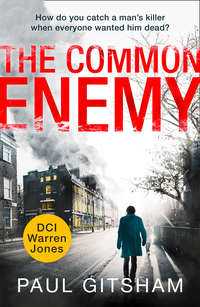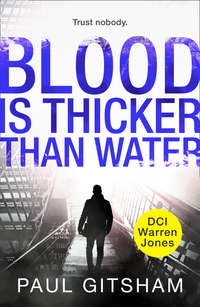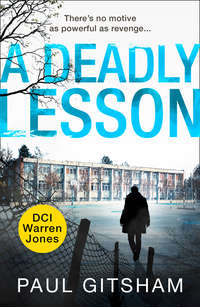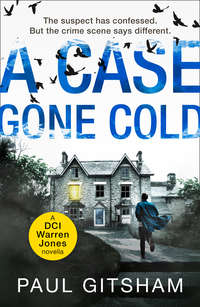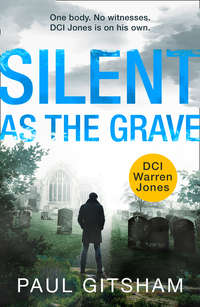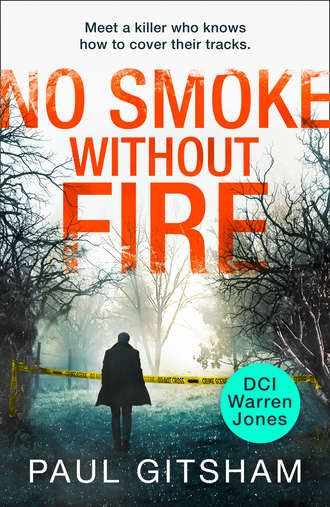
Полная версия
No Smoke Without Fire

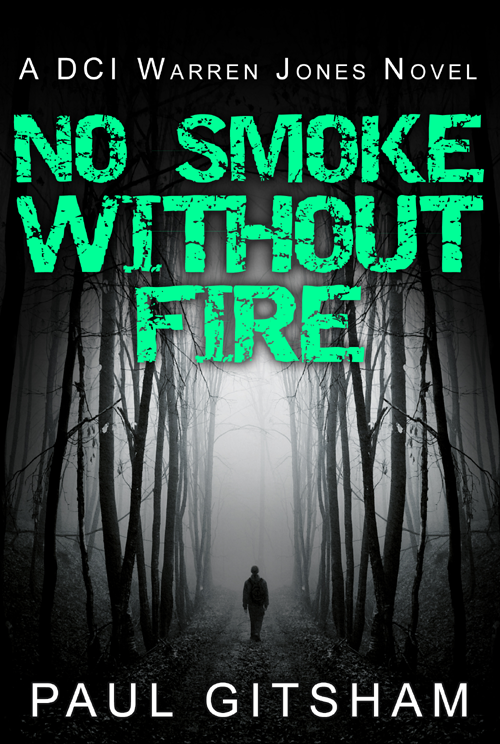
DCI Warren Jones has a bad feeling when the body of a young woman turns up in Beaconsfield Woods. She’s been raped and strangled but the murderer has been careful to leave no DNA evidence. There are, of course, suspects – boyfriend, father – to check out but, worryingly, it looks more and more like a stranger murder.
Warren’s worst fears are confirmed when another young woman is killed in the same way.
The MO fits that of Richard Cameron who served twelve years for rape. But Cameron never killed his victims and he has a cast-iron alibi.
Then personal tragedy intervenes and Warren is off the case. But the pressure is mounting and another woman goes missing. Warren is back but will the break he desperately needs come before there’s another victim?
Also by Paul Gitsham
The Last Straw
No Smoke Without Fire
A DCI Warren Jones Novel
Paul Gitsham

Copyright
HQ
An imprint of HarperCollinsPublishers Ltd.
1 London Bridge Street
London SE1 9GF
First published in Great Britain by HQ in 2014
Copyright © Paul Gitsham 2014
Paul Gitsham asserts the moral right to be identified as the author of this work.
A catalogue record for this book is available from the British Library.
This novel is entirely a work of fiction. The names, characters and incidents portrayed in it are the work of the author’s imagination. Any resemblance to actual persons, living or dead, events or localities is entirely coincidental.
All rights reserved under International and Pan-American Copyright Conventions. By payment of the required fees, you have been granted the non-exclusive, non-transferable right to access and read the text of this e-book on-screen. No part of this text may be reproduced, transmitted, downloaded, decompiled, reverse engineered, or stored in or introduced into any information storage and retrieval system, in any form or by any means, whether electronic or mechanical, now known or hereinafter invented, without the express written permission of HarperCollins.
E-book Edition © June 2014 ISBN: 9781472096487
Version date: 2018-09-20
PAUL GITSHAM
started his career as a biologist, working in such exotic locales as Manchester and Toronto. After stints as the world’s most over-qualified receptionist and a spell making sure that international terrorists and other ne’er do wells hadn’t opened a Junior Savings Account at a major UK bank (a job even less exciting than being a receptionist) he retrained as a Science Teacher. He now spends his time passing on his bad habits and sloppy lab-skills to the next generation of enquiring minds.
Paul has always wanted to be a writer and his final report on leaving primary school predicted he’d be the next Roald Dahl! For the sake of balance it should be pointed out that it also said “he’ll never get anywhere in life if his handwriting doesn’t improve”. Twenty five years later and his handwriting is worse than ever but millions of children around the world love him (*)
(*) This is a lie – just ask any of the students he has taught.
Paul writes the DCI Warren Jones series of novels. No Smoke Without Fire is the second, with more to come. He was brought up in Coventry and now lives in Hertfordshire. Remind you of anybody?
Acknowledgements:
Phew, that ‘difficult second novel’ wasn’t as difficult as I feared! And again, that’s in large part down to my wonderful family and friends who help and encourage me in everything. Whether they proof-read drafts, gave me their thoughts on extracts that I sent them or just said something really interesting that I shamelessly pinched…
As always, there are too many to list you all, but a few stand out. Again, my father and Lawrence proof-read the complete manuscript, corrected my grammar and gave me their thoughts. My favourite lawyers Dan and Caroline gave me sound legal advice and an insight into custody procedures. I am also extremely grateful to Crime Scene Investigator Lee Robson from Essex police, who’s description of the procedures and day-to-day working practise of the folks in white suits has been invaluable. I apologise sincerely for any errors or artistic liberties taken to advance the story.
And finally, a big thank you to Father David Barry who not only double-checked the authenticity of a key chapter, but also helped make my little sister’s wedding such a perfect day!
As always, the support and friendship of Hertford Writers’ Circle has been wonderful and I appreciate the fact that nobody reported me to the authorities for turning up each month with a new description of a grisly murder…
And finally, the editorial team and staff at CarinaUK and Harlequin, in particular Helen, Lucy and Victoria for their hard work on this and The Last Straw.
I hope you enjoy reading it as much as I enjoyed writing it.
Disclaimer:
The town of Middlesbury, Middlesbury CID and all characters featured in this book are entirely fictional and not intended to represent any real-world individuals or organisations. It is also important to stress that whilst Hertfordshire and Bedfordshire Constabularies are real organisations, they are not in any way affiliated to this book and the way that they are represented in this book is entirely imaginary.
To Mum and Dad. Thanks for everything.
Contents
Cover
Blurb
Book List
Title Page
Copyright
Author Bio
Acknowledgements
Dedication
Prologue
Chapter 1
Chapter 2
Chapter 3
Chapter 4
Chapter 5
Chapter 6
Chapter 7
Chapter 8
Chapter 9
Chapter 10
Chapter 11
Chapter 12
Chapter 13
Chapter 14
Chapter 15
Chapter 16
Chapter 17
Chapter 18
Chapter 19
Chapter 20
Chapter 21
Chapter 22
Chapter 23
Chapter 24
Chapter 25
Chapter 26
Chapter 27
Chapter 28
Chapter 29
Chapter 30
Chapter 31
Chapter 32
Chapter 33
Chapter 34
Chapter 35
Chapter 36
Chapter 37
Chapter 38
Chapter 39
Chapter 40
Chapter 41
Chapter 42
Chapter 43
Chapter 44
Chapter 45
Chapter 46
Chapter 47
Chapter 48
Chapter 49
Chapter 50
Chapter 51
Chapter 52
Chapter 53
Chapter 54
Chapter 55
Chapter 56
Chapter 57
Chapter 58
Chapter 59
Chapter 60
Chapter 61
Chapter 62
Chapter 63
Chapter 64
Chapter 65
Chapter 66
Chapter 67
Chapter 68
Chapter 69
Epilogue
Endpages
About the Publisher
Prologue
December 2010
The old man shuffles through the gate, blinking as if he hasn’t seen the sun in years. In many ways, he hasn’t. Not really. He’s dressed in a shabby grey suit that’s a size too small and a once expensive shirt, open at the neck. A simple crucifix on a thin metal chain is just visible, partly hidden by curling grey hair. The leather of his shoes creaks, having stiffened over time. In his right hand he clutches a blue plastic carrier bag — it contains all that he has owned for the last twelve years.
Behind him the guard stops, still inside. One more step and his authority evaporates; inside he is as a god, his jurisdiction absolute — outside he is no more than an ordinary man.
“I’m sure we’ll be seeing you again. Your kind never change. I just hope they catch you next time before you ruin any more lives.” His voice is muted, his cruel taunt only audible to the old man.
For his part, the old man keeps on walking as if he hasn’t heard a word; a few more paces as if to guarantee he is truly outside and he stops. Turning slowly to survey the place he has called home for over a decade, he looks slowly at the guard and fingers the crucifix.
“No, you won’t. I’m never coming back. I will never spend another day in that hell-hole.” His voice, quiet, raspy, damaged by too many cigarettes, is nevertheless resolute.
The guard scowls, disappointed that the prisoner — former prisoner — doesn’t rise to the bait. Sometimes they do; sometimes they start the first day of their new life in a bad mood, as he manages to turn a joyous occasion for the prisoner and his family into a nasty confrontation. Prisoners dream of the moment they step through those gates free men. They idolise it, constructing fantasies about how perfect it will be — as if they are soldiers returning from a far distant front line; conquering heroes, not the dregs of humanity finally released back into society, more often than not to pick up where they left off. The guard always does his best to spoil that moment — his final gift to his former charges. If he had his way, people like the old man would never leave — they’d serve time until their dying breaths, and then they’d be buried in unmarked graves in an inaccessible and overlooked part of the prison grounds.
Finally, the old man breaks his gaze and turns back towards the road, starting his shuffle again. He seems to notice the chill December wind for the first time and shivers. It was spring when he was driven through the gates that last time; the lightweight suit that he wore in his final court appearance more than adequate. Now it’s winter and he almost wishes he’d put on his prison-issue sweater. But no, he could never do that. He only has it in his bag so that he can light a bonfire with it and start to expunge the legacy of his recent incarceration. To have put the sweater back on would have been to surrender his freedom again. Never.
He waits on the side of the kerb, not quite sure what to do, his teeth starting to chatter. How ironic, he thinks, to have survived all of these years, only to freeze to death because his lift is late. Behind him he hears the whine of an electric motor, then the heavy thunk as the huge door closes, shutting him off from the nearest source of warmth for miles around. Never mind, he long ago made a promise to himself: even if the snow was three feet deep and the temperature twenty below freezing he would never step inside a prison again, either by choice or by compulsion; he’d rather die of exposure.
Finally, he hears the purr of a well-tuned engine. Looking up, he sees a dark blue Jaguar driving slowly towards him. Instinctively he knows it’s for him. The car, an unfamiliar model sporting the new type of licence plate that means nothing to him — yet another small detail that slipped past as he languished inside — eases to a halt. The driver reaches across and opens the passenger door. He remains leaning across the seat, looking up at the old man.
“Hello, Dad. You survived, I see.”
Twelve months later
Friday 2nd December
Chapter 1
The young woman stepped into the ice-cold December air. Six p.m. and already it had been fully dark for two hours. She operated her mobile phone with one hand, fumbling in her handbag with the other. Wrapped up tightly against the cold, with a long red woollen coat, a dark, knitted scarf and matching hat, she nevertheless had yet to put her gloves on, in deference to the touchscreen on her phone.
Activating it, she saw that it was precisely one minute past six. Selecting the text icon, she read the short message:
On my way babes. C U soon. X
She smiled as she finally located her cigarettes and lighter. Darren was on time as always. The couple had developed a well-oiled routine over the year that they had lived together. Darren would leave the tyre fitters where he worked at six on the dot and drive across town to pick her up. A devious little rat-run let him avoid Middlesbury’s one-way system in the rush hour and arrive in the side street behind her office building at about ten past six, giving her just enough time to enjoy a well-earned cigarette. Unfortunately, the only place he refused to allow her to smoke was in the passenger seat of his well-loved and heavily customised Vauxhall Astra.
Truth be told, she thought the Astra was a bit much. A man in his mid-twenties really ought to have grown out of motoring magazines and ‘pimping his ride’ as he liked to call it. It seemed ludicrous to her that a grown man couldn’t see the folly of spending thousands of pounds customising a car worth less than five hundred. Then again, he couldn’t understand why she insisted on buying more shoes and handbags when she had a wardrobe full already. In the end they had agreed to disagree. Besides which, it beat catching two buses to and from work every day.
She took a long drag on her cigarette and was surprised to hear the sound of an engine entering the far end of the road. That was quick, she thought as she took another hit, anticipating the need to stub it out at any moment. It had to be Darren — the narrow side street was little more than an alleyway and she couldn’t remember ever seeing anyone else using it in the past year. The local businesses put their recycle bins out for the council to collect on a Monday morning, but as far as she knew the bin lorries didn’t even come up there; the refuse collectors just dragged them around the corner to the main road.
At that moment her phone beeped; a short note from her best friend, confirming that she was coming around at eight with a bottle of rosé and a DVD.
Despite the distraction, her subconscious had spotted something was not quite right; the engine sounded wrong. Rather than the throaty growl of Darren’s twin exhausts, it was the grumbly rattle of a diesel engine that made her look up. She blinked in surprise at the unexpected sight, then mentally shrugged. It was a common enough sight in other parts of town; she wouldn’t have even noticed it if she hadn’t been expecting Darren. She turned her attention back to her mobile, already ignoring the vehicle as it pulled up to the kerb a few metres past her. Out of the corner of her eye she saw the driver get out and start to walk towards her.
The driver was only a few paces away from her when she finally paid attention. What alerted her she would never know. Was it the purposeful stride in her direction? The fact that the vehicle shouldn’t be here at this time of the evening, let alone stationary with its driver out? Or was it the smell, sweet yet slightly acrid, even at this distance? A scarf covered his mouth against the cold, a woollen cap pulled low hid most of the rest of his features. With a jolt of surprise she realised he was wearing one of those rubber masks that you could buy in a joke shop.
She opened her mouth to scream, but it was too late. The driver covered the last three paces impossibly fast, his right hand blurring upward towards her face. Suddenly her nose was filled with a solvent smell that reminded her of her mother cleaning paintbrushes in turpentine. She struggled to breathe, her eyes filling with tears, but the driver’s hand was clamped tightly across her face. The world was already starting to spin; a sudden feeling of lightness swept through her body and a rushing noise filled her ears. Her legs weakened and before she knew it she was slumping downwards as if trying to sit on the kerb.
The world was now turning a fuzzy light grey, like an old-fashioned TV set when you pulled the aerial lead out, followed by a dark grey, then finally black. Her last memory was the clatter of plastic on concrete as her mobile phone hit the pavement.
Three Days Later
Monday 5th December
Chapter 2
The strident ring of a mobile phone sang out in the silenced hall. Three hundred pairs of eyes swivelled immediately towards the back row and Susan Jones cringed in embarrassment, trying to disappear from view. Beside her, her husband, Detective Chief Inspector Warren Jones, fumbled frantically for the offending gadget, trying in vain to silence it. On stage, the earnest fourteen-year-old girl started to sing the opening notes of ‘Silent Night’, before stumbling and losing her place as the phone rang for a second time. The teacher accompanying her on the piano stopped playing and turned around, glaring at the audience.
A chorus of tuts and hisses sounded from around the auditorium as Jones got to his feet and tried to leave the darkened room as unobtrusively as a six-foot man holding a ringing, glowing mobile phone, seated in the middle of a row of interlocked school chairs, could manage.
Mumbling his apologies, Warren stumbled into the centre aisle, knocking over at least two handbags and a pair of precariously balanced crutches. Resisting the urge to break into a run, he strode with as much dignity as he could muster to the rear exit. As he slipped through the double doors into the hallway outside he heard the piano start up again and the opening notes of the young soloist. The phone continued to ring. Giving up on trying to silence the damned thing using its touchscreen, Warren simply answered it.
“One moment, Tony, I can’t talk now.” Although he had whispered into the handset, his voice seemed to echo down the hallway. The two white-haired ladies setting up the coffee urn and interval biscuits scowled at him. As he hurried towards the front of the school he prayed that nobody had recognised him. The last thing he wanted was for the school’s new Head of Biology to become known to the Parent Teacher Association and other gossips as ‘that science teacher with the really rude husband’.
Finally finding himself alone in the school’s reception area, he was able to answer the call. “OK, Tony, what have you got?”
The booming Essex voice on the end of the phone sounded amused. “Caught you at a bad time, guv?”
“You could say that. Let’s just say that ‘Silent Night’ was suddenly no longer silent. What’s happened?”
All traces of humour immediately left the other man’s voice. “You’d better get over here, boss. We’ve got a body.”
* * *
Less than thirty minutes later, Warren carefully manoeuvred his dark blue Ford Mondeo up a sodden dirt track. The cold December night was pitch black, the dark and threatening rain clouds blotting out the nearly full moon and stars. The only lights visible were the flashing blue strobe from the police patrol car blocking the road and the interior lights of the empty ambulance parked next to it.
To his left, Warren saw several parked vehicles. He made out the familiar white outline of Detective Inspector Tony Sutton’s sports car, a Scenes of Crime incident van and a few others that he didn’t recognise.
A middle-aged uniformed sergeant with a clipboard stepped out to greet him.
“DCI Jones?”
He scribbled Warren’s name and time of arrival on the scene log and directed Warren to park up next to Sutton’s Audi.
“DI Sutton is at the scene, sir, along with the paramedics and the members of the public that found the body. A Scenes of Crime manager is on site and others are on their way; should be here within the hour.”
“Thank you, Sergeant. Where is the body?”
The officer pointed ahead, up the dirt track.
“A couple of hundred yards up there. Apparently it was found by a group of dog-walkers. They were pretty on the ball, by the sounds of it. They stood still and phoned for us; didn’t trample all over the scene. They swear that they only walked on the footpath, so we’ve made that the main access route.”
Warren nodded his approval; the sergeant seemed pretty on the ball himself. It never ceased to amaze him the way that despite all of the pleas and warnings from the crime scene specialists, many police officers — detectives included — insisted on poking around the site of a suspicious death, potentially destroying any evidence before it could be collected. By designating the already forensically compromised footpath as the only access route to the crime scene, the sergeant had ensured that any evidence in the surrounding area would be left undisturbed.
Pulling out his mobile again, Warren called Tony Sutton. The detective inspector answered immediately.
“I’m down at the main gate,” Warren informed him. “I have a paper suit in the boot of the car. I’ll come and join you.”
With the aid of the sergeant’s powerful Maglite torch, Warren perched on the edge of his open car boot as he squirmed into a white ‘Teletubby’ suit made out of plastic-coated paper. The last thing he wanted to do was contaminate the scene with any trace evidence from his own clothes; he could destroy valuable clues, or, worse, he could give the murderer’s legal team the tools necessary to raise reasonable doubt and secure an acquittal.
Finally, suited and booted and feeling faintly ridiculous, he clumsily started up the path. Even without the large torch, he could have found his way; the designated path was wide and well-established and somebody had stuck metre-high sticks in the ground with police tape around them to act as a guideline.
As he walked Warren felt himself shiver, and not just because of the crisp air. The path cut through a small stretch of woodland and the trees loomed forbiddingly on either side of him. The rustle of his paper suit and the sound of his breathing weren’t quite enough to hide the haunting hoot of an owl, hunting in the distance. A sudden rustle to his right betrayed the presence of some small animal, spooked by the powerful beam of his torch. It was at times like this that Warren was reminded of the fact that, despite enjoying a country walk on a summer’s afternoon as much as the next man — especially if it involved a pub or two — he really was a city dweller.
Continuing his slow trudge, he became more accustomed to his surroundings: the damp smell of the woodland, the faint pull against each footstep from the muddy path. It had rained a bit the day before, he recalled. Depending on when the body had been dumped the scene was either preserved with nice footprints in the damp soil and the victim covered in fibres and other forensic gifts, or nature had done her best to cleanse the area and make the Scenes of Crime team’s job harder.



